
General Notes and Context:
I was originally invited by the heads of the China World Science Fiction society, Renwei Dong, Haijun Yao, and Wu Yan, to attend the Chinese Nebula Awards ceremony in Beijing, through the kind offices of Ruhan Zhao. Later the invitation was extended by the company Xinhuanet for Wayne and I to then spend a week in Chengdu. It was our first trip to China; getting the visas got complicated and down to the last minute wire but finally everything arrived two days before the actual departure.
Arrival in Beijing and the Chinese Nebulas
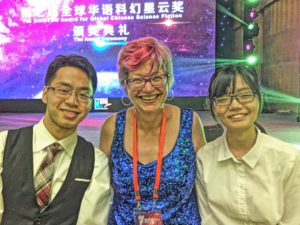
We left September 7th and arrived in Beijing on the 8th, where Jingbo Chen and Ruhan picked us up at the airport. We had dinner that night with Mr. Dong, Ms. Song, and other members of the association. The next day, we went to Qinghua University that evening, and I gave a speech on what is new in American SF for the first of several times. This was my first chance to meet our terrific interpreters. They were awesome and just amazing in their ability to listen and speak at the same time. Phenomenal. Plus one had an English accent, was constantly gravely polite even when being thwarted in her duties, and reminded me of a Chinese David Tennant.
On the 10th, we had numerous panels and discussions at the National Library, along with a terrific banquet that night. We stayed at the National Library Hotel, which had a wonderful bookish modern but still traditional vibe, and had breakfasts most mornings there. This was interesting because it was in the same cafeteria with the government workers and was our first real introduction to the phenomenon of Chinese breakfast. The location was great, however. The ceremonies were held nearby in one of the actual library buildings, and started with a red carpet walk and the signing of a wall. There were several hundred people at the actual ceremonies (I think).
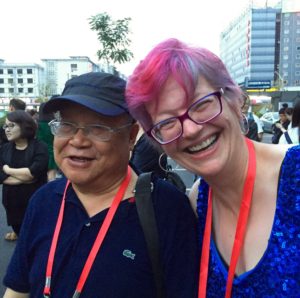 On the 12th Kelly took us and Crystal Huff, the Finncon co-chair who was also part of the Chinese Nebulas, to a lake reservoir and the Mungtian site of the Great Wall. It was everything I’d hoped and more, and a site that lives up to a writer’s imaginings is a rare one indeed. That evening we had dinner with Crystal, Kelly, Kelly’s boss Richard Lee, and her co-worker Martin at Huo’s restaurant, where we had Peking duck and other amazing foodstuffs. The wonderful floor show included noodle making, dough balloons, tea pouring, and a woah-wait-how-did-they-do-that face changing show. Afterwards we walked around a little bit, then took the subway (where Wayne enchanted a suspicious toddler) to see the Birds Nest and Olympic Park by night. The subway was a quicker way to get around than taxi most of the time and was very easy to use.
On the 12th Kelly took us and Crystal Huff, the Finncon co-chair who was also part of the Chinese Nebulas, to a lake reservoir and the Mungtian site of the Great Wall. It was everything I’d hoped and more, and a site that lives up to a writer’s imaginings is a rare one indeed. That evening we had dinner with Crystal, Kelly, Kelly’s boss Richard Lee, and her co-worker Martin at Huo’s restaurant, where we had Peking duck and other amazing foodstuffs. The wonderful floor show included noodle making, dough balloons, tea pouring, and a woah-wait-how-did-they-do-that face changing show. Afterwards we walked around a little bit, then took the subway (where Wayne enchanted a suspicious toddler) to see the Birds Nest and Olympic Park by night. The subway was a quicker way to get around than taxi most of the time and was very easy to use.
We were treated very well. I found that SF is currently very hot in China. Overall, recent wins by Cixin Liu have drawn significant attention to SF in China. In all of this, I am speaking primarily about science fiction, rather than fantasy, since the Chinese see the two genres as very distinct from each other. There has also historically been tension between science writing and science fiction, which is the past has been perceived as being aimed at children, or at least that is something that came up multiple times over the course of the visit.
Nowadays, that’s very different. Numerous groups in China are working on putting together Worldcon bids and I would suspect the question is not so much whether or not we’ll see a Worldcon bid from China in coming years so much as which city will host it: Beijing, Chengdu, or Shanghai. Several people, including the World Science Fiction Society, said that they’d love to see SFWA’s Nebulas hosted over in China if we’re ever interested in doing that. Crystal Huff had been sponsored by the first group as part of their effort to research what would be needed to run a Worldcon.
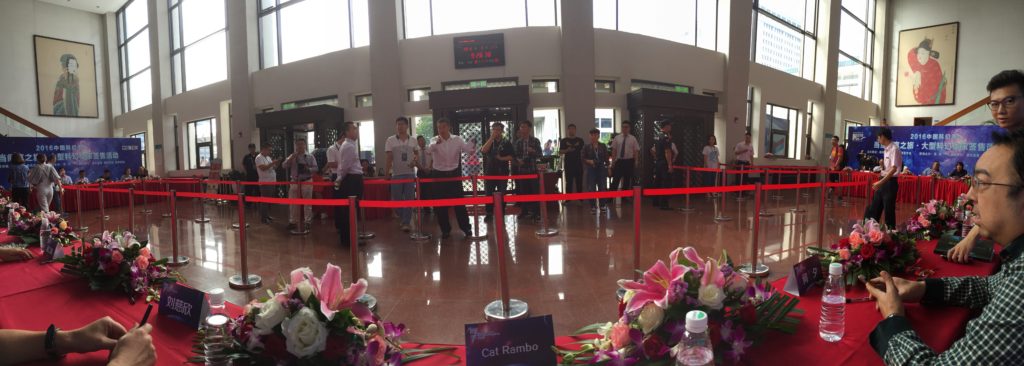
One of the things that I really noticed at the ceremonies and the signing that occurred the next day: the Chinese fans really love science fiction. I sat next to Cixin Liu at the signing and some of his fans were vibrating with the joy of interacting with him to a point that I might have reserved for Paul McCartney when I was a teen-age Cat. They were adorable. They also — and the writers as well — skewed considerably younger than the overall crowds I see at the usual Nebula or other American gatherings. Many of these folks are the future, and I’m pleased to get a chance to interact with so many of them.
The next day Kelly and Martin took Wayne, Crystal, and I in for interviews and to meet with the head of CEPIEC, who went with us for a delicious lunch. Afterwards we went with Martin over to Beiha Park, where we went boating, and then strolled the grounds, viewing the last of the lotus blossoms. We were lucky to be there for the Autumn Festival, so we ate lots of kinds of the traditional moon cakes, and Kelly brought us a big bagful of them when we set off.
Mr. Dong made sure we were well taken care of throughout our visit to Beijing and that we had everything we needed. Sean Gao very kindly postponed his flight back to Chengdu in order to accompany our hapless selves, which was good, because we needed his linguistic intervention a couple of times as we bewildered someone.
Chengdu and Xiuhuanet
In Chengdu, we were met by Tulip, who was our interpreter, and JingJing of Xinhuanet and her assistant Annie. They took us to the hotel and then out with Sean to what turned out to be the first of AMAZING meals. SO DELICIOUS. SO DELICIOUS.
They planned a lot of stuff for us, which really made this the trip of a lifetime, particularly since often we got behind the scenes level tours (and often a meal). Luckily for me, Tulip furnished a detailed itinerary of our many and varied activities, so I can be extremely precise here:
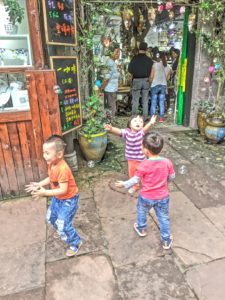
Wuhou shrine, Jinli street
Jinsha site museum/Huang longXi ancient town
Our very first stop was the Wuhou shrine. Here was my first encounter with Zhuge Liang, an early paragon of wisdom whose shrine this is, although it shares space with the temple of Liu Bei (a Chinese emperor). Very green and serene and historic, and very informative, since Tulip, a well-traveled and experienced guide, turned out to be a font of interesting Chinese history. From there we walked over to the bustle and noise of Jinli street, which featured all sorts of crafts and foods, including displays of silkworm cocoons being unspun and the silk threads being processed to make into comforters. JingJing bought us all spicy peanut candy; next time I’m trying some of the spun sugar candy, like the phoenixes we saw being displayed.
Lunch! And then to the ancient town, which was in a fruit-growing area, with piles of grapes, figs, and kiwis for sale along the road. The town was very cool, and featured more kinds of crafts, this time including some freshwater pearls and nifty masks carved from bamboo root. This was where I picked up a new mask for my collection and took some of my favorite pictures, including the one of children chasing bubbles.
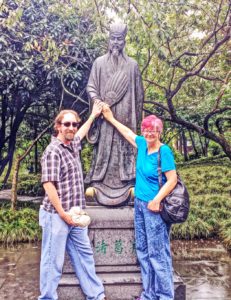
Panda base in Dujiangyan city
Dujiangyan irrigation program
Hexiang mountain villa
Pandas! No cuddling them, alas, but lots of looking and learning about them, all in beautiful surroundings and taken around by a nice guide who answered all sorts of questions. After that, Dujiangyan, which was super cool and much more interesting than the phrase “irrigation program” might imply. For one thing, it was built in 256 BC and still controls water for over 5000 square kilometers of farmland not via a dam system, but by dividing and channeling the water via ingenious means of long wicker baskets filled with stones, called zhulong, which ended up making the Sichauan district the most productive in the country.
Lots of greenery, in many ways a shrine to water and very beautiful. Here we met Zhuge Liang again, and had our photo taken with him, a tradition meant to evoke his genius in the person touching his hand. After that we headed to a new hotel, the Hexiang mountain villa, a hotel built to evoke an old Chinese palace, which had a lot of beautiful carvings. There was a wedding going on there the same night, with a ton of people; it looked like a gorgeous place for a reception.
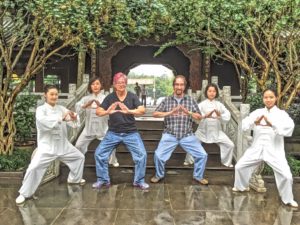
September 17
Qingchen Mountain
Afternoon – Taiguli street
Watching Sichuan opera
In the morning, we watched a little tai chi being staged in the courtyard then ate breakfast at the hotel before heading to Qingchen Mountain, the birthplace of Taoism, and learned a good bit about both Taoism and Buddhism on our trip up the mountain. Very green and clean, with a beautiful lake halfway up.
Back in Chengdu that evening, we strolled through one of the shopping districts, Taiguli Street, which was full of international goods and high fashion store. After dinner, we headed to watch a show that included plenty of opera along with some other wonderful staged stuff, including a reiteration of amazing mask dancers.
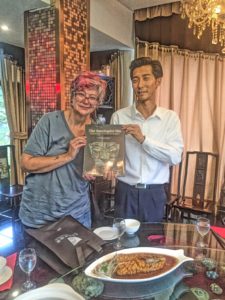 September 18
September 18
Sanxindui site museum
Evening speech at Southwest Jiaotong University
Another amazing trip, this time to see bronzes from 4000 years ago, in a very cool museum. The director was kind enough to have lunch with us after we’d had a guided tour of the museum’s two buildings. The relics are beautiful and when we got back to the hotel later, we realized there was a full-size replica of one of the museum’s “money trees” in its lobby.
That night, after yet another terrific dinner. I made a speech at the local university to a crowd of perhaps 50 or 50 students, who asked all sorts of interesting questions, and who also very sweetly brought me flowers, a beautiful arrangement of lilies that made the hotel room very fragrant. Tulip did a great job coping with all the demands on her vocabulary; she hadn’t encountered much science fiction before and we even had her buying The Three-Body Problem by the end of the trip.
September 19
Wuhou district Sci-fi town
Xinhua.net and interview
Dinner – hot pot!
In the morning we went for a tour of The Wisesoft virtual reality studio, and learned a lot about the Wuhou District, in a meeting that included Jing Gong, Director of the Chengdu Wuhou District Broadcasting Press and Publication Bureau, After that we went to Xinhua.net, where I did a couple of interviews and spent some pleasant time with JingJing’s boss Dawei Hou, and Vice President, Jiangying Shen.
Dinner was Mongolian hot pot! The next morning JingJing brought me a bunch of hot pot makings and then an early morning trip through Chengdu streets followed by tearful farewells at the airport.
Things I Learned about Chinese SF
Some writers I want to point to so I have their names stuck here for future reading. Many of them were there at the Nebulas.
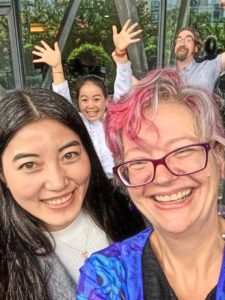
Que A, Shu Bao, Liu Bing, Zhang Cao, Xia Chao, Hongyu Chen, Qiufan Chen, Jingbo Cheng, Bessie Gu, Bo Jiang, Ni Kuang, Xingshi Liu, Yang Lu, Xe Lv, Xiong Mo, Hu Shaoyan, Han Song, Jinkang Wang, He Xi, Xinghan Xiao, Wang Xiaoda, Jian Wu, Huang Yi, Ran Zhang, Wenjing Zhang, Jun Zheng, Zinghzi Zhou
In all of this, I should mention that more than anyone else, Ken Liu has really led the way and shaped SF decades to come by bringing so much attention to Chinese SF. Cixin Liu (who gave me a copy of his third book that I am looking forward to finishing this week) may be Da Liu in China, but surely Ken deserves his own descriptor.
Traveling Tips for Other American SF Writers Visiting China for the First Time
Wifi is everywhere, but the Internet can be frustrating. Facebook and Twitter are censored in China; Wechat is a Chinese version of Facebook that is very popular. I started the trip with just a couple friends on Wechat and now have several dozen. (I am Catrambo on Wechat; feel free to add me.) One implication of the Facebook/Twitter ban is that if you have plug-ins from either social network on your website Chinese readers will have to use a VPN to access your website, which is why I’ve removed the Twitter plugin from my site. It is pretty easy to get a VPN connection through various applications however.
An important note for Americans: water is different there. You cannot drink tap water (I would be careful even using it to rinse after brushing one’s teeth) and sometimes where American restaurants routinely provide water, Chinese establishments will not. For example, I got in the habit of taking a bottle with me to breakfast in Beijing, because the only drink provided there was hot milk, along with a lot of tasty but very dry food.
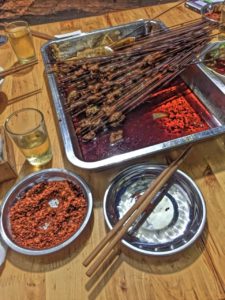
Along the same practical lines, a friend told me they were worried about the toilets. Well, they are a different mode than we see here in the US, but anyone who’s survived toilets someplace like a concert or a county fair is probably going to be able to navigate the worst of it. I dunno. What one is doing remains much the same worldwide. You should remember to carry a few tissues with you; you’ll need it maybe one in three times.
People are super nice overall. Schoolkids in particular want to test out the English they’re learning in school and will Hello how are you and/or ask for a photo with you. While out sightseeing, I noticed people noticing us but it never felt obtrusive or creepy and they would often smile and exchange greetings. This is a point where people’s mileage may vary considerably — I am usually in the midpoint between introvert and extrovert, but have found that the SFWA presidency has nudged me over to extrovert by about 20 points.
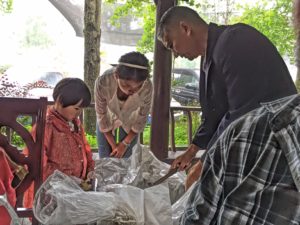 Generally the degree of enthusiasm most American SF writers not familiar with the culture will feel while in China will depend greatly on their ability to operate outside their comfort zone and willingness to be a little flexible, patient, and find misunderstandings funny rather than frustrating. My happiness with the trip is shaped from how much I fell in love with the language and culture as I prepped for the trip, and I know this has been a life-changer in at least a few ways. For one, I’m much more aware of Chinese SF and likely to seek it out. For another, I’m keeping up with my Mandarin study/practice. And finally, I know some of the friendship I made during the trip are ones that will last and deepen in coming years.
Generally the degree of enthusiasm most American SF writers not familiar with the culture will feel while in China will depend greatly on their ability to operate outside their comfort zone and willingness to be a little flexible, patient, and find misunderstandings funny rather than frustrating. My happiness with the trip is shaped from how much I fell in love with the language and culture as I prepped for the trip, and I know this has been a life-changer in at least a few ways. For one, I’m much more aware of Chinese SF and likely to seek it out. For another, I’m keeping up with my Mandarin study/practice. And finally, I know some of the friendship I made during the trip are ones that will last and deepen in coming years.
Overall, I came away from this trip filled with a great deal of joy and optimism for the future. I was reminded that while there may be all sorts of weird convulsions in the day to day course of things, humanity continues to plod onward and that the motion is generally upward, even when the speed of that trend may not be all we’d hoped. A lot of the casual sexism, racism, and classism I saw as a child or teen is gone, even though sometimes it seems as though it keeps trying to manifest in new shaggy-haired forms. Now China is opening up and with it even more new voices. Fabulous!
Will I go back? Yup. In fact, I’ve already pencilled the Chinese Nebulas in on my 2017 calendar and if I can make it sooner, I may, because I really did enjoy the folks and the sights and everything to the point where I was saddened to leave, plus there are a bunch of things I missed that I want to go back for.
Some resources for additional reading:
An article about SF World, China’s Science Fiction publication
SF fan and news organization Future Affairs Administration associated with Guokr Publishing.
World of Chinese magazine. Article on the history of Chinese SF.
Article on the Three Generals of Chinese SF
Life Week Magazine










54 Responses
Thank you for sharing, Cat. You brought back many fond memories of the wonderful people and fabulous food of China. Great photos, too! 🙂
Mike Brotherton liked this on Facebook.
Melanie Rambo liked this on Facebook.
Elizabeth Bourne liked this on Facebook.
Touya Tachihara liked this on Facebook.
Lisa Su liked this on Facebook.
Sharon Joss liked this on Facebook.
Nona Rambo liked this on Facebook.
What a fabulous experience! Thank you for sharing, and I hope you get to do it again
Esther Hazleton liked this on Facebook.
Kelby J. Barker liked this on Facebook.
Marta Murvosh liked this on Facebook.
Danielle Myers Gembala liked this on Facebook.
Yang-Yang Wang liked this on Facebook.
Randy Rambo liked this on Facebook.
Jaime O. Mayer liked this on Facebook.
John Doppler liked this on Facebook.
Stephen Gold liked this on Facebook.
Eva Eldridge liked this on Facebook.
Ruhan Zhao liked this on Facebook.
Barbara Ann Caldwell-Pease liked this on Facebook.
Darin Calhoun liked this on Facebook.
Tamara Vining liked this on Facebook.
John Chu liked this on Facebook.
Sara A Mueller liked this on Facebook.
Kari Kilgore liked this on Facebook.
John L. Forrest liked this on Facebook.
Gibson Michaels liked this on Facebook.
Caroline M. Yoachim liked this on Facebook.
You’re in Chengdu! I am so jealous. It’s one of my must-go places (well, that and the Huanglong Valley. For reasons :D)
Joseph Brassey liked this on Facebook.
Ron Friedman liked this on Facebook.
Notes and pictures from my trip to Beijing and Chengdu for the Chinese Nebula Awards – https://t.co/dT7s3lIzVV
Gay Partington Terry liked this on Facebook.
Javier David liked this on Facebook.
Linda Isakson liked this on Facebook.
RT @Catrambo: Notes and pictures from my trip to Beijing and Chengdu for the Chinese Nebula Awards – https://t.co/dT7s3lIzVV
RT @Catrambo: Notes and pictures from my trip to Beijing and Chengdu for the Chinese Nebula Awards – https://t.co/dT7s3lIzVV
@Catrambo so wonderful!
Rashida Scholz liked this on Facebook.
Linda Jordan-Eichner liked this on Facebook.
Amy Wolf liked this on Facebook.
John McColley liked this on Facebook.
Kip M Raney liked this on Facebook.
Tasha Turner Lennhoff liked this on Facebook.
Shaoyan Hu liked this on Facebook.
Joyce Pusel liked this on Facebook.
Cat Rambo’s wonderful article on China.
Beijing/Chengdu Trip, September 2016: Some Notes, Observations, and Images https://t.co/6dT4sXWXBJ
Cat Rambo’s Beijing/Chengdu Trip, September 2016: Some Notes, Observations, and Images https://t.co/uIv8EKuZFh
“Cixin Liu…may be Da Liu in China, but surely @kyliu99 deserves his own descriptor.” @Catrambo https://t.co/dFF97mmfqw
@beckminster @Catrambo hahaha. Thank you Cat and Nick!
RT @beckminster: “Cixin Liu…may be Da Liu in China, but surely @kyliu99 deserves his own descriptor.” @Catrambo https://t.co/dFF97mmfqw